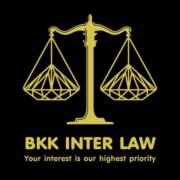Best Mining Law Lawyers in Don Mueang
Share your needs with us, get contacted by law firms.
Free. Takes 2 min.
List of the best lawyers in Don Mueang, Thailand
About Mining Law in Don Mueang, Thailand
Mining law in Don Mueang, Thailand, is governed by a combination of national legislation and local regulations. Mining activities, which involve the extraction of minerals and other geological materials from the earth, are strictly regulated to ensure environmental protection, manage natural resources responsibly, and safeguard the interests of local communities. The primary legislation is the Minerals Act B.E. 2560 (2017), which outlines procedures for obtaining mining rights, environmental obligations, and compliance standards for all parties involved in mining activities within Thailand. In Don Mueang, mining activities are limited and primarily pertain to small-scale operations due to its urban development, but all relevant legal requirements still apply.
Why You May Need a Lawyer
Legal advice is essential in mining matters because the regulations are complex and constantly evolving. You may require a lawyer if you are:
- Applying for a mining license or concession
- Dealing with land use issues involving potential mineral extraction
- Facing environmental compliance checks or disputes
- Negotiating contracts with local businesses, landowners, or government agencies
- Dealing with alleged violations of mining laws or environmental regulations
- Managing community relations and compensation processes
- Transferring or inheriting mining rights
- Faced with criminal or civil litigation regarding mining operations
- Involved in international aspects of the mining business, such as cross-border partnerships
A specialized lawyer can help you understand your rights and responsibilities, guide you through the application process, and represent you in legal proceedings should any disputes arise.
Local Laws Overview
In Don Mueang, mining activities, although limited, must comply with both national and local regulations. The key aspects include:
- Licensing: All mining operations require a valid license from the Department of Primary Industries and Mines (DPIM). The type of license depends on the scale and nature of extraction.
- Environmental Requirements: Operators must submit Environmental Impact Assessments (EIA) and adhere to relevant environmental protection laws, including waste management and rehabilitation after closure.
- Land Use Laws: Mining cannot take place on restricted lands, such as protected forests or urban zones without explicit permission.
- Community Consent: In some cases, especially where local communities are affected, consent from those communities may be required.
- Health and Safety Regulations: Mining operations must implement safety measures to protect workers and the public.
- Taxation and Fees: Royalties and taxes must be paid on extracted minerals, and financial guarantees may be required for rehabilitation costs.
- Export Controls: Exporting minerals is subject to additional permits and compliance with customs regulations.
Frequently Asked Questions
What types of minerals can be legally mined in Don Mueang?
The types of minerals can vary, but common categories include construction materials such as sand and gravel. Large-scale operations are rare due to urbanization, but small-scale extraction is permitted with the appropriate licenses.
Who issues mining licenses in Don Mueang?
Licenses are issued by the Department of Primary Industries and Mines (DPIM), part of the Ministry of Industry.
What are the main steps to obtain a mining license?
Applicants must submit a detailed proposal, conduct an Environmental Impact Assessment where applicable, gain necessary approvals including community or landowner consent, and fulfill financial and technical requirements before issuance.
Are there restrictions on where mining can take place?
Yes. Mining is not allowed in protected areas, national parks, or zones designated as residential or sensitive by local authorities without special permits.
What environmental regulations apply to mining?
Operators must comply with Environmental Impact Assessments, waste disposal regulations, water management requirements, and are usually required to restore land after mining concludes.
What happens if I operate without a license?
Operating without a valid mining license is a criminal offense. Penalties include heavy fines, imprisonment, and confiscation of any materials or equipment used in the illegal operation.
How do I resolve disputes with landowners or other businesses?
Most disputes are settled through negotiation, mediation, or, if needed, litigation in the Thai courts. Lawyers experienced in mining law can assist in dispute resolution.
Are foreign nationals allowed to own mining rights in Don Mueang?
Foreign ownership is restricted. Joint ventures with Thai nationals or locally registered companies are typically required. Regulations are strict to protect the country’s natural resources.
What taxes or royalties will I have to pay?
Operators must pay royalties based on the quantity and type of minerals extracted, in addition to standard business taxes and licensing fees.
Can mining rights be transferred or inherited?
Mining rights can be transferred or inherited, but any transfer must be approved by the authorities and comply with all legal requirements, including due diligence checks.
Additional Resources
Several organizations and agencies can provide guidance and additional information on mining law in Don Mueang, Thailand:
- Department of Primary Industries and Mines (DPIM): The principal regulatory authority for mining activities and licensing.
- Ministry of Industry: Oversees industrial and mineral resource policies nationwide.
- Office of Natural Resources and Environmental Policy and Planning (ONEP): Responsible for environmental assessments.
- Don Mueang District Office: Local authority for zoning and land use permissions.
- Thai Chamber of Commerce: Provides business advisory for international ventures and partnerships.
- Professional law firms specializing in mining and environmental law: For direct legal advice and representation.
Next Steps
If you are considering involvement in mining activities in Don Mueang or facing a related legal issue, it is important to:
- Gather all relevant documents, such as land titles and business registrations
- Consult with a qualified lawyer who has experience in Thai mining law
- Seek early advice before entering into agreements or beginning operations
- Contact local authorities to clarify any location-specific regulations
- Prepare for possible environmental assessments or public hearings if required
Taking these steps early can help you avoid legal pitfalls, reduce risks, and ensure your mining activities comply fully with Thai law.
Lawzana helps you find the best lawyers and law firms in Don Mueang through a curated and pre-screened list of qualified legal professionals. Our platform offers rankings and detailed profiles of attorneys and law firms, allowing you to compare based on practice areas, including Mining Law, experience, and client feedback.
Each profile includes a description of the firm's areas of practice, client reviews, team members and partners, year of establishment, spoken languages, office locations, contact information, social media presence, and any published articles or resources. Most firms on our platform speak English and are experienced in both local and international legal matters.
Get a quote from top-rated law firms in Don Mueang, Thailand — quickly, securely, and without unnecessary hassle.
Disclaimer:
The information provided on this page is for general informational purposes only and does not constitute legal advice. While we strive to ensure the accuracy and relevance of the content, legal information may change over time, and interpretations of the law can vary. You should always consult with a qualified legal professional for advice specific to your situation.
We disclaim all liability for actions taken or not taken based on the content of this page. If you believe any information is incorrect or outdated, please contact us, and we will review and update it where appropriate.









